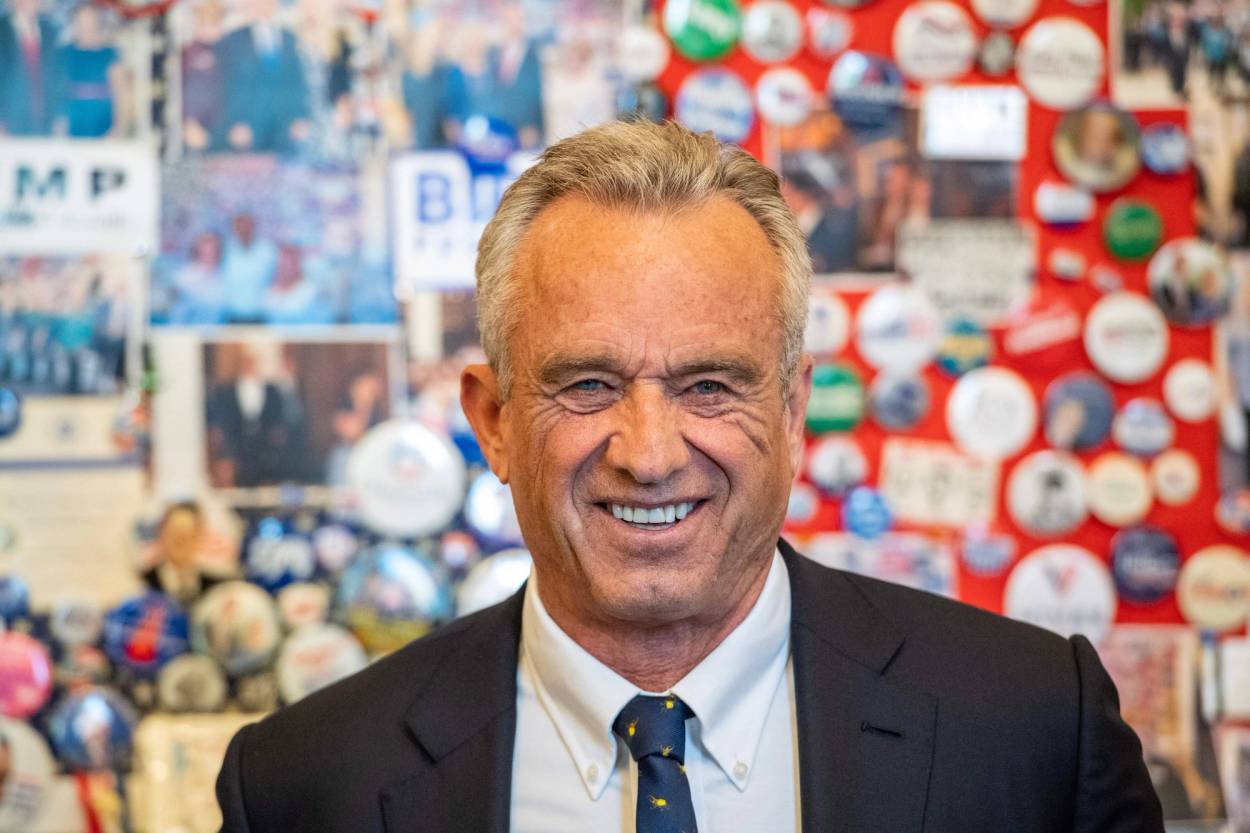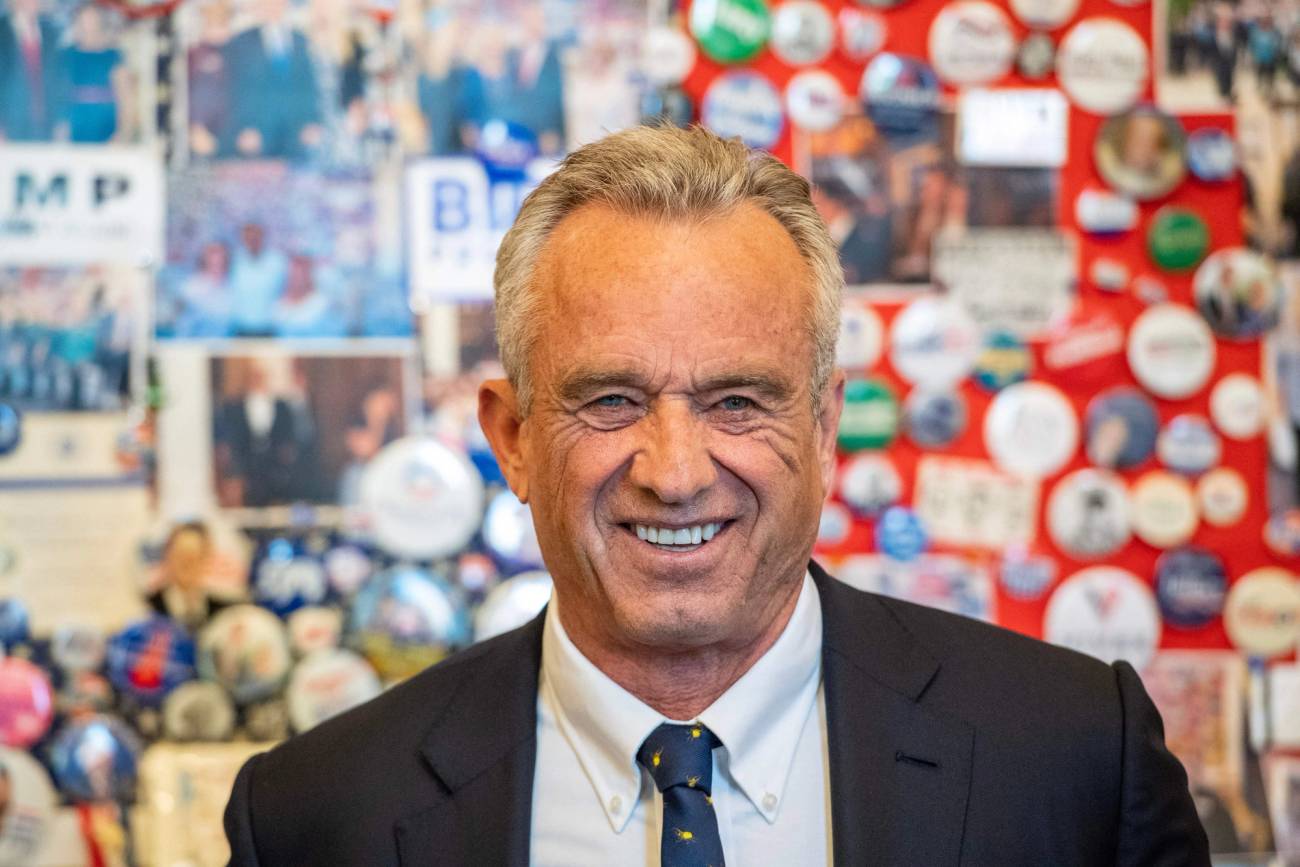The Media’s Hypocrisy on Vaccines
The New York Times is bashing RFK for vaccine skepticism that it helped stoke when it thought it would hurt Donald Trump

JOSEPH PREZIOSO/AFP via Getty Images

JOSEPH PREZIOSO/AFP via Getty Images

JOSEPH PREZIOSO/AFP via Getty Images

JOSEPH PREZIOSO/AFP via Getty Images
Since Robert F. Kennedy Jr. tossed his hat into the 2024 presidential ring, his detractors have repeatedly pointed to one issue as evidence that he’s unfit to be president: his skepticism of the COVID-19 vaccines. The reality, however, is that the same media institutions depicting Kennedy as a wingnut spreading fringe conspiracy theories played a key role in popularizing vaccine resistance.
The sheer volume of sudden reversals in public health policy makes it difficult to recall what anyone was claiming a few years ago, but there is a simple formula to understand why “the science” keeps changing: It’s often about who benefits politically. In the months before the 2020 election, the Trump administration seemed close to hitting its stated goal of delivering a COVID vaccine by the end of the year. That would have been a clear boost to the president’s electoral chances.
Evidently alarmed by this prospect, the mainstream media, led by The New York Times, hit on the novel tactic of claiming that Big Pharma had used its financial might to corrupt government oversight of their development. The storyline had the distinct benefit of being a direct offshoot of the media’s larger narrative about Trump’s thoroughgoing and relentless corruption.
One of the first, most detailed and fleshed-out versions of the Big Pharma-COVID vaccine theory can be found in the early days of The New York Times’ COVID-19 reporting. On May 20, 2020, the Times launched its first broadside in this effort. The headline of the article, “Trump’s Vaccine Chief Has Vast Ties to Drug Industry, Posing Possible Conflicts,” painted a picture of lurking corruption, invoking a network of malfeasance reminiscent of Hillary Clinton’s “vast right-wing conspiracy.”
The first paragraph underscored this point, alleging that Trump’s new virus “czar,” Moncef Slaoui, former head of vaccines at GlaxoSmithKline, had “intricate ties to big pharmaceutical interests.” The Times went on to enumerate the $12.4 million worth of Slaoui’s shares in Moderna—even though Slaoui had sold those shares as he stepped into his government role. The Times also repeatedly implied that administration officials involved in the development of the vaccines possessed vast conflicts of interest, writing that Health Secretary Alex Azar “is a former Eli Lilly executive” and former FDA commissioner Scott Gottlieb “has moved in and out of government twice.”
The paper’s later stance on the integrity of the vaccine development process aside, this all would have been worthy reporting, important for the American public to know. But the Times went far beyond showing the ties of officials to the pharmaceutical industry and—months before a single vaccine had been produced—began insinuating that any vaccine produced could carry major risks. “[Moderna’s vaccine] technology, which uses genetic material from the virus called mRNA, is relatively new and unproven. And many vaccine candidates fail after showing preliminary promise, or cause serious side effects in later human trials,” the Times wrote in its May 2020 piece (emphasis added).
Just two weeks later the paper went much further, implying in a June 3, 2020 article that COVID vaccine corruption was systematic and political. “Operation Warp Speed amounts to a sprawling, on-the-fly experiment in industrial policy by a Republican administration that has been otherwise dedicated to giving private industry a free hand,” two Times reporters asserted.
There is a simple formula to understand why ‘the science’ keeps changing: It’s often about who benefits politically.
There were, to be sure, irregularities and conflicts of interest in the emergency authorization to produce the COVID vaccines (not surprising given that pharma is the largest and most powerful lobby in the United States). But the media coverage of the issue, which reached a fever pitch in the Trump years but fell mostly silent on the topic once Trump was out of power, ignored nuances to score political points. The unintended consequence was that, imbued with more than a grain of truth, the story about Big Pharma putting profit ahead of prudence took on a life of its own. Now that the political winds have shifted, the media is essentially fighting a narrative of its own creation.
By late summer 2020, this narrative was braided with another about vaccine malfeasance, simultaneously slamming Trump for rushing the vaccine development process and for allegedly lying about the rollout date. In May 2020, after Trump said he was “confident” vaccines would be available by the end of the year, it triggered a barrage of snark from supposedly neutral fact-checkers attempting to refute the president’s claim. NBC’s fact-check offers an example of the genre: “experts say [Trump] needs a ‘miracle’ to be right.” Trump was simultaneously painted as an unreliable fibber who would never be able to follow through on his promises while being accused of rushing to get the vaccines ready ahead of the November election.
But the gut punch came when the Times again questioned the safety of the vaccines being produced. “Under constant pressure from a White House anxious for good news and a public desperate for a silver bullet to end the crisis, the government’s researchers are fearful of political intervention in the coming months and are struggling to ensure that the government maintains the right balance between speed and rigorous regulation,” the Times reported in an August 2020 piece.
By that month, the media’s effort began to pay dividends. A week after the Times claimed the Trump administration was “desperate for a silver bullet,” news broke that House Democrats had opened an investigation into Slaoui on the basis of the Times’ unfounded allegations. NBC News, citing the Times’ claims, reported that Democratic Rep. Jim Clyburn had called financial arrangements involving Operation Warp Speed “opaque.”
In September, the Times ran an op-ed by American historian Rick Perlstein that cast the government’s plan to use emergency authorization for the COVID vaccine as Trump’s “most reckless obsession yet.” This bid, the Times op-ed blared in alarm, could end with the vaccines being distributed “before some scientists believe it would be safe to do so” and in a way that could “further erode public confidence in vaccines—and possibly kill.”
Those tropes in fact were and are similar to those advanced by Robert F. Kennedy Jr.—tropes that, as if by magic, are now roundly condemned by the media that lent them credibility and seeded them into the public consciousness.
By the time of the 2020 election, the notion that Big Pharma had unduly influenced the COVID vaccines for profit was media gospel. The accepted narrative was that, with a nod from Trump, Big Pharma had rushed out potentially dangerous experimental vaccines with a bevy of unknown side effects. With so much momentum behind it, this idea continued to gather steam. And now it’s more like an out-of-control freight train than the power-corridor Acela it was supposed to be. The media is reaching for the brakes but the public, long since convinced, is racing full steam ahead.
Ashley Rindsberg is the author of The Gray Lady Winked: How The New York Times’s Misreporting, Distortions and Fabrications Radically Alter History (2021).